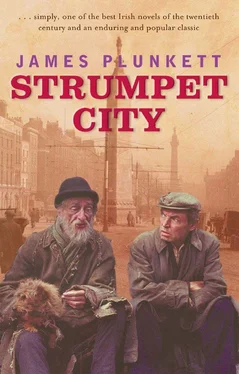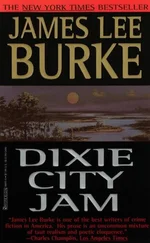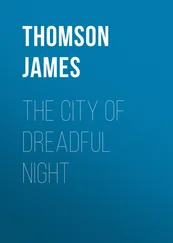‘I appreciate what you have told me.’
‘It is the only piece of truth I have ever learned,’ Father Giffley said.
Father O’Connor guessed he was being challenged. If so, organising charity was an excellent beginning. Some of the poor, at least, could be fed. Not them all, because there were too many. One started with the most deserving. And, of course, with those who seemed tempted to apostasise, even though the apostate could never be said to be deserving.
‘I will give thought to what you’ve told me, Father,’ he said.
In the presbytery the clerk had Father O’Connor’s black cope and biretta laid out for him and beside it the brass bowl and the sprinkler for the holy water. He was rubbing his hands with the cold. Hanlon’s labours, though inefficient at the best of times, were missed. The boilerman was dead, and the pipes out of action. A damp cold had gripped every part of the church.
‘He went off very sudden, Father,’ the clerk said.
‘He did, poor man.’
‘The oul chest was very poorly,’ the clerk said. Father O’Connor took the book and marked the appropriate section with a purple-coloured tab. He did not answer the clerk. Recognising that the priest had no desire to talk about the dead boilerman, the clerk turned to business.
‘There are two people in the outer room wishing to see you,’ he said.
‘They must wait,’ Father O’Connor told him.
He vested reluctantly and went down the church to the porch-way, where he paused and saw that the funeral had arrived and was marshalled on the far side of the street. In the light of the gas-lamps the leading horses waited, their black plumes stiff and upright. On each side of the hearse a candle flame wavered in its little glass tomb. Behind stood the mourners: the women with shawls over their heads, the men—now that the church door had been reached—uncovered. Traffic passed slowly to show respect and stopped on either side when the hearse and followers began to cross the street. They held the coffin at the church door while Father O’Connor, about to admit it, sprinkled it with holy water, welcoming what was left of Hanlon back to the church he had spent some winters working in. Under his aloft hand the fittings became marked with blobs of holy water. The leading women began to weep loudly. One of the men, grey-haired and shabby, nodded a greeting to Father O’Connor, who did not know him but placed him as a brother of Hanlon’s because there was a clear resemblance. Without acknowledging him Father O’Connor turned and walked down the echoing church. It amplified the sounds of grief and the sharp contact of boots on marble. In the mortuary chapel he stood at the head of the coffin once again and read the prayers, four candles in front of him. The people were poor, yet the coffin was a good one. It was a point of honour with them to bury their dead decently. He led them in a decade of the rosary, his voice unhurried but efficient, his mind quite detached from his surroundings. He found it impossible to feel anything about his congregation. Here, in a shadowed chapel, dismal with cold, where the air was unpleasant because of the corpse and the close-packed mourners, another one of the obscure thousands was poised between the anonymity of his life and the anonymity of the grave. Day after day he said the same prayers and went through the same ceremonial. There were particular deaths no longer, only Death in general.
He conduded and was approached by the grey-haired man.
‘I was his brother,’ he said in a whisper. Father O’Connor realised that he expected formal sympathy.
‘I see,’ Father O’Connor said. He handed the sprinkler back to the clerk.
‘Good evening, Andy,’ the man said to the clerk.
‘I’m sorry for your trouble, Pat,’ the clerk said.
‘You were a good friend, Andy.’
Father O’Connor took the man’s hand.
‘I will pray for your brother at my masses,’ he said.
‘Thank you, Father, you’re very kind.’
It seemed to be enough. The grip on Father O’Connor’s hand tightened for a moment and was withdrawn. He returned to the sacristy.
Father O’Connor unvested. There was a void inside him as though Jesus Christ himself were a lie and there was no Church, no Belief, nothing but the dominion of darkness and mortality. He wondered that he should want to help anybody, least of all the poor. They came carrying their stinking corpses to be blessed and despatched. They were uncouth and ill-clad and rough of tongue. They had faces and forms that were half animal. The clerk whispered:
‘The two people is still inside, Father. A young couple. They want to arrange to get married.’
To get married. To sleep in the sweat of one bed and deposit in due time a few more animal faces among the dirt and the dilapidation.
‘They must wait,’ Father O’Connor snapped, and turned away.
He felt he must clean himself, change his clothes, wash. He thought of his mother and ached for her presence, for her comforting voice and lovable fingers. Taking the Galway rosary from his pocket, he went to the prieu-dieu and knelt for a long time, not so much in prayer as in thought, his mind reliving what remained with him of childhood, the favourite memories he had guarded passionately against annihilation. They helped as they always did.
The clerk, returning, found him still on his knees and was about to withdraw again when Father O’Connor rose and said in a voice which betrayed his tiredness:
‘Please tell the two people I am coming.’
‘It won’t be necessary now,’ the clerk said, ‘Father Giffley is already with them.’
‘I thought Father Giffley was in his room.’
‘He came down a while ago and found them waiting. He said he would deal with it.’
‘Thank you,’ Father O’Connor said, wondering bitterly if Father Giffley was in a condition to talk to anybody. He decided he did not care, and went out again to the church, where he stood for some time in the mortuary chapel. The coffin plate bore the name ‘Edward Hanlon’ and was still damp from the sprinkler. The Christian name looked out of place. It had never been used when Hanlon was referred to about the church. The shrine in front of the small altar was ablaze with candles, which the mourners had lit before leaving. For each candle a halfpenny had been dropped into the donation box, a small sum which called, nevertheless, for self-sacrifice. They made an occasion of death, giving it its due in candles and coffins.
At the high altar he tried to pray again, but still the emptiness dragged at him, his feeling of depression and purposelessness increased. He abandoned the attempt after a while and moved down the almost empty church to the porchway, where he clasped his hands behind his back and stared dismally at the traffic. His immediate need, he knew, was companionship. In Kingstown he could have muffled up and walked briskly between rows of elegant houses to the seafront, where one could pace away depression and the air was always fresh and invigorating. He could have called on one of his parishioners and spent an hour or so in pleasant conversation. There was no one to talk to in that way here.
A voice beside him said: ‘Good evening, Father.’
It was Rashers Tierney. He was about to let him pass with a formal nod when an idea occurred to him.
‘Just a moment,’ he said.
Rashers, who had put on his hat in the porch, removed it again. Father O’Connor took in the shabby clothes and the hungry-looking face. Why not? Surely here was a deserving case, a poorer one than the poor themselves.
‘Have you been in the church?’
‘I showed a young couple the way to the presbytery. Then I went in to say a prayer or two for the late lamented.’
‘You knew Hanlon?’
Читать дальше












